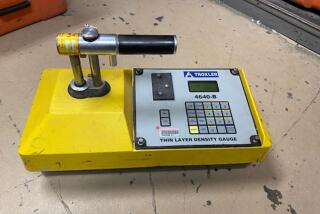Paramedics Get Lifesaving Device : 2 Firefighters Win Battle for Use of Blood-Sugar Meter
- Share via
After a six-month effort, two Carlsbad firefighters have won approval from emergency medical authorities to require all county paramedics to carry a pocket-size device that could help save lives.
The device, a small meter that measures blood-sugar levels, will provide vital information to paramedics in the field--especially those treating unconscious stroke victims or diabetics.
Michael Kinkade and Chris Heiser, who are also paramedics for the Carlsbad Fire Department, recently won the approval from the San Diego County Emergency Medical Services advisory committee, which helps set medical care protocol.
Quick, Accurate Diagnoses
Guidelines that Kinkade and Heiser have written to instruct paramedics on the meter’s use will be submitted to the advisory committee today.
Once the guidelines are incorporated into the protocol in early September, all county paramedics will be required to use the meter.
Kinkade said the device should prove most valuable in helping paramedics make quick, accurate diagnoses for stroke victims or diabetics in emergency situations, whose survival often depends on fast treatment.
Determining whether a person is unconscious as a result of low blood sugar--as in the case of a diabetic--or is suffering a stroke can be difficult for paramedics, because symptoms for both can be nearly identical, Kinkade said.
But treating the cases identically, as protocol currently dictates, can have grave consequences, he said.
Administering dextrose, a form of glucose, can quickly resolve the diabetic’s problem, but recent studies have shown that such treatment can cause brain damage in the stroke victim.
Should Eliminate Guesswork
On the other hand, failing to raise a diabetic’s low blood sugar level could lead to a coma.
The meter should take the guessing out of the diagnostic process, Kinkade said.
“Right now, protocol demands that we give dextrose to a patient without knowing whether the person is suffering from a stroke or hypoglycemia,” Kinkade said. “We’re doing this while there are studies suggesting that, in a stroke patient, a glucose solution can cause brain damage and may increase the mortality rate of that patient.
“I can’t tell you that this will save X many number of lives,” Kinkade said. “But it’s so easy to use, it costs about $2 a test. . . . There’s really no reason not to use them.”
Although pleased that paramedics will soon be using the meters, Kinkade, as well as members of the diabetes community, question whether the six-month effort to win approval was necessary.
The meter has been widely employed by diabetics for more than five years to monitor blood-sugar levels and by hospitals nationwide. Paramedics in Orange and Riverside counties are already using the meter.
Two-Month Test Period
The advisory committee required the Carlsbad paramedics to conduct a two-month pilot program.
During the test period between March and May, paramedics measured patients’ blood-sugar levels by using the meter and compared the results to those from traditional hospital laboratory equipment.
Kinkade said that on a rating scale that considered 1.00 perfect (meter and lab results matched in every test case), the two types of meters that were tested scored well: .83 and .81.
“That may not be perfect, but right now we’re just guessing and hoping that we’re right,” Kinkade said. “The meter, added to our training and other assessment tools, improves our diagnostic ability greatly.”
Each of the county’s paramedic units will be responsible for purchasing the $130 device and a supply of meter strips. (A box of 50 costs $25.) They may charge a fee to the patient who is treated with the meter, Kinkade said.
More to Read
Sign up for Essential California
The most important California stories and recommendations in your inbox every morning.
You may occasionally receive promotional content from the Los Angeles Times.












